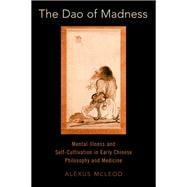Mental illness complicates views of agency and moral responsibility in ethics. Particularly for traditions and theories focused on self-cultivation, such as Aristotelian virtue ethics and many systems of ethics in early Chinese philosophy, mental illness offers powerful challenges. Can the mentally ill person cultivate herself and achieve a level of virtue, character, or thriving similar to the mentally healthy? Does mental illness result from failures in self-cultivation, failure in social institutions or rulership, or other features of human activity? Can a life complicated by struggles with mental illness be a good one?
The Dao of Madness investigates the role of mental illness, specifically "madness" (kuang), in discussions of self-cultivation and ideal personhood in early Chinese philosophical and medical thought, and the ways in which early Chinese thinkers probed difficult questions surrounding mental health. Alexus McLeod explores three central accounts: the early "traditional" views of those, including Confucians, taking madness to be the result of character flaw; the challenge from Zhuangists celebrating madness as a freedom from standard norms connected to knowledge; and the "medicalization" of madness within the naturalistic shift of Han Dynasty thought. Understanding views on madness in the ancient world helps reveal key features of Chinese thinkers' conceptions of personhood and agency, as well as their accounts of ideal activity. Further, it exposes the motivations behind the origins of the medical tradition, and of the key links between philosophy and medicine in early Chinese thought. The early Chinese medical tradition has crucial and understudied connections to early philosophy, connections which this volume works to uncover.








